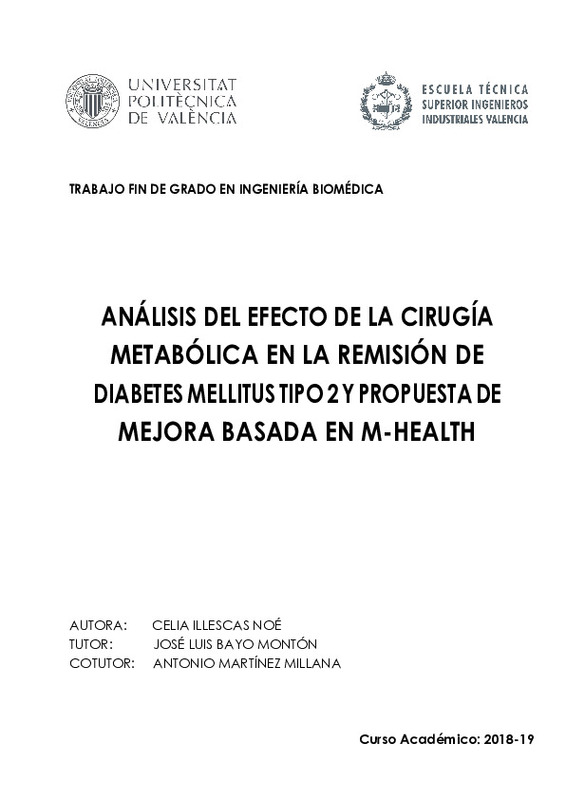JavaScript is disabled for your browser. Some features of this site may not work without it.
Buscar en RiuNet
Listar
Mi cuenta
Estadísticas
Ayuda RiuNet
Admin. UPV
ANÁLISIS DEL EFECTO DE LA CIRUGÍA METABÓLICA EN LA REMISIÓN DE DIABETES MELLITUS TIPO 2 Y PROPUESTA DE MEJORA BASADA EN M-HEALTH
Mostrar el registro sencillo del ítem
Ficheros en el ítem
| dc.contributor.advisor | Bayo Montón, José Luis
|
es_ES |
| dc.contributor.advisor | Martínez Millana, Antonio
|
es_ES |
| dc.contributor.author | Illescas Noé, Celia
|
es_ES |
| dc.date.accessioned | 2019-09-02T14:08:35Z | |
| dc.date.available | 2019-09-02T14:08:35Z | |
| dc.date.created | 2019-07-10 | |
| dc.date.issued | 2019-09-02 | es_ES |
| dc.identifier.uri | http://hdl.handle.net/10251/124774 | |
| dc.description.abstract | [ES] El manejo del paciente intervenido con cirugía bariátrica se basa en el refinamiento continuo de las terapias farmacológicas y el asesoramiento sobre el estilo de vida (por ejemplo, dieta, actividad física) que tiene como objetivo mantener y aumentar la calidad de vida mediante la prevención de comorbilidades o complicaciones que puedan aparecer. Este proceso continuo está respaldado por actividades clínicas y no clínicas que varían según el contexto, es decir, que la respuesta dinámica dependerá del nivel de adherencia a las recomendaciones, reacciones no controladas al tratamiento propuesto y otros factores que no dependen únicamente de la voluntad del paciente. Los procesos post-operatorios son altamente dinámicos, complejos y requieren un enfoque multidisciplinar, ya que cada unidad de endocrinología tiene su propia manera de implementar las guías clínicas estándar. Mejorar los procesos de atención de la salud no es una tarea fácil, aunque está claro que a través de su optimización, tanto la calidad de vida de los pacientes como el uso de recursos clínicos se pueden aumentar y optimizar. Actualmente no existe evidencia sobre el efecto que provocan los estilos de vida saludable en la remisión de pacientes con Diabetes Tipo 2. Nuestro enfoque consiste en estudiar las vías clínicas de los pacientes intervenidos como indicador de la progresión metabólica y de obesidad en pacientes con Diabetes Tipo 2 y proponer una solución basada en tecnologías móviles para la captura de datos y descubrir las diferencias debidas a factores intrínsecos y extrínsecos del paciente. | es_ES |
| dc.description.abstract | [EN] The management of the patient undergoing bariatric surgery is based on the continuous refinement of pharmacological therapies and lifestyle advice (for example, diet, physical activity) that aims to maintain and increase the quality of life through the prevention of comorbidities or complications that may appear. This continuous process is supported by clinical and non-clinical activities that change according to the context, that is, that the dynamic response will depend on the level of adherence to the recommendations, uncontrolled reactions to the proposed treatment and other factors that do not depend only on the patient's will. Post-operative processes are highly dynamic, complex and require a multidisciplinary approach, since each endocrinology unit has its own way of implementing standard clinical guidelines. Improving the processes of health care is not an easy task, although it is clear that through its optimization, both the quality of life of patients and the use of clinical resources can be increased and optimized. Currently there is no evidence on the effect of healthy lifestyles on the remission of patients with Type 2 Diabetes. Our approach is to study the clinical pathways of patients operated on as an indicator of metabolic progression and obesity in patients with Type 2 Diabetes and propose a solution based on mobile technologies for the capture of data and discover the differences due to intrinsic and extrinsic factors of the patient. | es_ES |
| dc.language | Español | es_ES |
| dc.publisher | Universitat Politècnica de València | es_ES |
| dc.rights | Reserva de todos los derechos | es_ES |
| dc.subject | Diabetes Mellitus Tipo 2 | es_ES |
| dc.subject | Cirugía bariátrica | es_ES |
| dc.subject | Obesidad | es_ES |
| dc.subject | Salud móvil | es_ES |
| dc.subject | Análisis de datos | es_ES |
| dc.subject | Vías clínicas | es_ES |
| dc.subject | Diabetes Mellitus Type 2 | es_ES |
| dc.subject | Bariatric surgery | es_ES |
| dc.subject | Obesity | es_ES |
| dc.subject | Mobile health | es_ES |
| dc.subject | Data analysis | es_ES |
| dc.subject | Clinical pathways | es_ES |
| dc.subject.classification | TECNOLOGIA ELECTRONICA | es_ES |
| dc.subject.other | Grado en Ingeniería Biomédica-Grau en Enginyeria Biomèdica | es_ES |
| dc.title | ANÁLISIS DEL EFECTO DE LA CIRUGÍA METABÓLICA EN LA REMISIÓN DE DIABETES MELLITUS TIPO 2 Y PROPUESTA DE MEJORA BASADA EN M-HEALTH | es_ES |
| dc.type | Proyecto/Trabajo fin de carrera/grado | es_ES |
| dc.rights.accessRights | Abierto | es_ES |
| dc.contributor.affiliation | Universitat Politècnica de València. Departamento de Ingeniería Electrónica - Departament d'Enginyeria Electrònica | es_ES |
| dc.contributor.affiliation | Universitat Politècnica de València. Escuela Técnica Superior de Ingenieros Industriales - Escola Tècnica Superior d'Enginyers Industrials | es_ES |
| dc.description.bibliographicCitation | Illescas Noé, C. (2019). ANÁLISIS DEL EFECTO DE LA CIRUGÍA METABÓLICA EN LA REMISIÓN DE DIABETES MELLITUS TIPO 2 Y PROPUESTA DE MEJORA BASADA EN M-HEALTH. http://hdl.handle.net/10251/124774 | es_ES |
| dc.description.accrualMethod | TFGM | es_ES |
| dc.relation.pasarela | TFGM\109403 | es_ES |
Este ítem aparece en la(s) siguiente(s) colección(ones)
-
ETSII - Trabajos académicos [10404]
Escuela Técnica Superior de Ingenieros Industriales






